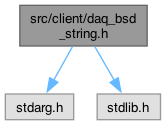#include <stdarg.h>#include <stdlib.h>
Include dependency graph for daq_bsd_string.h:

This graph shows which files directly or indirectly include this file:

Go to the source code of this file.
Functions | |
| size_t | _daq_strlcpy (char *dst, const char *src, size_t size) |
| Copy from src to dest. This copies from src to dest. It will always null terminate dest. | |
| size_t | _daq_strlcat (char *dst, const char *src, size_t size) |
| Append src to dest. This copies from src to the end of dest. It will always null terminate dest. | |
| size_t | _daq_strlremainder (const char *src, size_t size) |
| Return the number of usable bytes left at the end of the given string. | |
| size_t | _daq_slprintf (char *dst, size_t size, const char *fmt,...) |
| a length aware printf that appends to dst. | |
Function Documentation
◆ _daq_slprintf()
| size_t _daq_slprintf | ( | char * | dst, |
| size_t | size, | ||
| const char * | fmt, | ||
| ... | |||
| ) |
a length aware printf that appends to dst.
- Parameters
-
dst The destination character array to append data to size The total size of the destination buffer fmt The format to apply, interpreted by printf ... The arguments to format
- Returns
- The size of the string after printing, if it is larger than size then the string is truncated. @notes Use this as snprintf, except that the size is the total buffer size, not just the remaining amount.
◆ _daq_strlcat()
| size_t _daq_strlcat | ( | char * | dst, |
| const char * | src, | ||
| size_t | size | ||
| ) |
Append src to dest. This copies from src to the end of dest. It will always null terminate dest.
- Parameters
-
dst Pointer to the destination which is at least size bytes long (this is the total size, including existing content, not just the remaining buffer space available). src Source buffer, which must be a NULL terminated string size the length of dst (including space for a NULL byte)
- Returns
- The size of the string that was requested, ie strlen(src) + strlen(dst). This is done to match the bsd interface, which uses this feature to detect truncation when the return value is >= size.
- Note
- if src == NULL or dst == NULL or size == 0 this will do nothing
- In a difference from the bsd version, strlcat ALWAYS null terminates if size > 0.
◆ _daq_strlcpy()
| size_t _daq_strlcpy | ( | char * | dst, |
| const char * | src, | ||
| size_t | size | ||
| ) |
Copy from src to dest. This copies from src to dest. It will always null terminate dest.
- Parameters
-
dst Pointer to the destination which is at least size bytes long src Source buffer, which must be a NULL terminated string size the length of dst (including space for a NULL byte)
- Returns
- The size of the string that was requested, ie strlen(src). This is done to match the bsd interface, which uses this feature to detect truncation when the return value is >= size.
- Note
- if src == NULL or dst == NULL or size == 0 this will do nothing and will return 0
◆ _daq_strlremainder()
| size_t _daq_strlremainder | ( | const char * | src, |
| size_t | size | ||
| ) |
Return the number of usable bytes left at the end of the given string.
- Parameters
-
src A NULL terminated string size The maximum size of the string (counting the NULL terminator)
- Returns
- The number of bytes that can be appended to the string while staying withing a max size of size bytes (counting the NULL terminator).